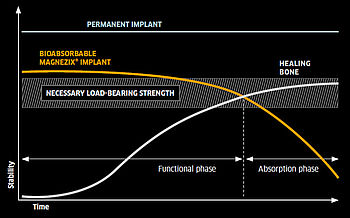Stability alone is not everything
MAGNEZIX® boasts values for mechanical stability which far exceed those of previous bioresorbable materials, and therefore define a completely new generation of absorbable implants. The beneficial, so-called stress-extension ratio (E-modulus) of magnesium is the most similar to normal bone of all of the known metal alloys, and counteracts the so-called "stress shielding effect" which can lead to a reduction in bone density.
Many metals have a much higher stiffness compared to bone, and this can lead to "stress shielding". Inactivation of the bone metabolism in the fracture zone can hinder remodelling, which in turn can lead to osteoporosis - all avoided with MAGNEZIX®!
Moreover, an implant made of MAGNEZIX® is gradually bioresorbed by the body during the course of healing, so that the regrowing bone can successively adjust to the load and become capable of tolerating more stress.
During the function phase, the implant sits in the bone until the bone has re-established enough load-bearing capacity, from which time on, the implant is no longer needed, is further absorbed, and remodelled into bone tissue.
Magnesium: essential for the body and strong bones
MAGNEZIX® implants simply dissolve. And more importantly, they promote bone growth and are gradually transformed into bones by the body. The extraordinarily good biocompatibility and tolerability of the material result in particular from the comparatively high daily requirement of the human body on the element magnesium (Mg), which is the main component (over 90 %) of MAGNEZIX®.
Magnesium is only loosely bound in bones so that it is rapidly available. In this way, a magnesium implant whichdissolves in the bone like MAGNEZIX®, can also be regarded as a source of magnesium ions essential for metabolism. In addition, it can prevent infections, because the Mg-degradation creates an anti-bacterial basic milieu in the immediate vicinity of the implant.
The recommended daily dietary intake of magnesium is between 375 mg and 500 mg, depending on age and sex. An average MAGNEZIX® implant (CS 3.2, 20 mm in length) contains about 150 mg of magnesium. This quantity corresponds approximately to the magnesium content of three large bottles of commercially available mineral water and is negligible compared to the total body content - an overdosing or other harmful effects can also be excluded because the screw is transformed over a long period of time.
With MAGNEZIX®, you can rely on the proven stability of a metallic implant and at the same time benefit from a better compatibility than other resorbable polymer implants.
No allergens
Magnesium is a natural element and important for many processes and functions in the body, and is also very tolerable and biocompatible - and therefore extremely unlikely to give rise to allergies and similar problems.
An advantage of MAGNEZIX® in this context is that it contains more than 90 percent magnesium. In addition, it does not contain any nickel, cobalt, chromium or aluminium - all suspected of giving rise to serious illnesses. Conclusion: absolutely no allergies or foreign body reactions have been reported for MAGNEZIX® implants!
Magnesium is important for:
- Protection of the heart and circulatory system
- Control of muscle and nerve functions
- Construction and consolidation of bones (mineralization) and teeth
- Burning of carbohydrates and fats (energy metabolism)
- Buildup of protein and genetic information (DNA)
- Release of messenger substances, processing of stress
Magnesium is indispensable for utilising oxygen and cell generation, as well as energy generation and processing within the body. Magnesium normalises the excitability of nerve cells, and stabilises cell membranes. It ensures that the cell walls are not too permeable with respect to sodium, potassium and calcium, and helps maintain their concentrations in the blood at an optimum level.
The daily intake of magnesium lies between 375 mg and 500 mg, a MAGNEZIX® implant consists of over 90 per cent magnesium and contains approx. 150 mg on average (CS 3.2, 20 mm length), which approximately corresponds to the amount in three large bottles of mineral water, and is much less than the magnesium contained in dissolvable tablets used as nutritional supplements. Because of the small amount and slow degradation of the implant, an overdose can be completely excluded - on the contrary: magnesium in the bones is particularly easily absorbed by the body.
How safe is MAGNEZIX®?

MAGNEZIX® implants are class III medical products and are thus subject to the highest safety standards with the strictest requirements for safety and quality. The implants manufactured by us are tested by TÜV and approved for Europe (CE certificate). In addition, MAGNEZIX® fulfills the particularly high approval standards of the internationally renowned HSA (Health Sciences Authority) in Singapore.

MAGNEZIX® CS has been approved in over 50 countries worldwide (Status February 2019) and has already proven itself several thousand times. MAGNEZIX® CS implants are safe and of the highest quality "Made in Germany". Because all our products are developed and manufactured exclusively in Germany!


